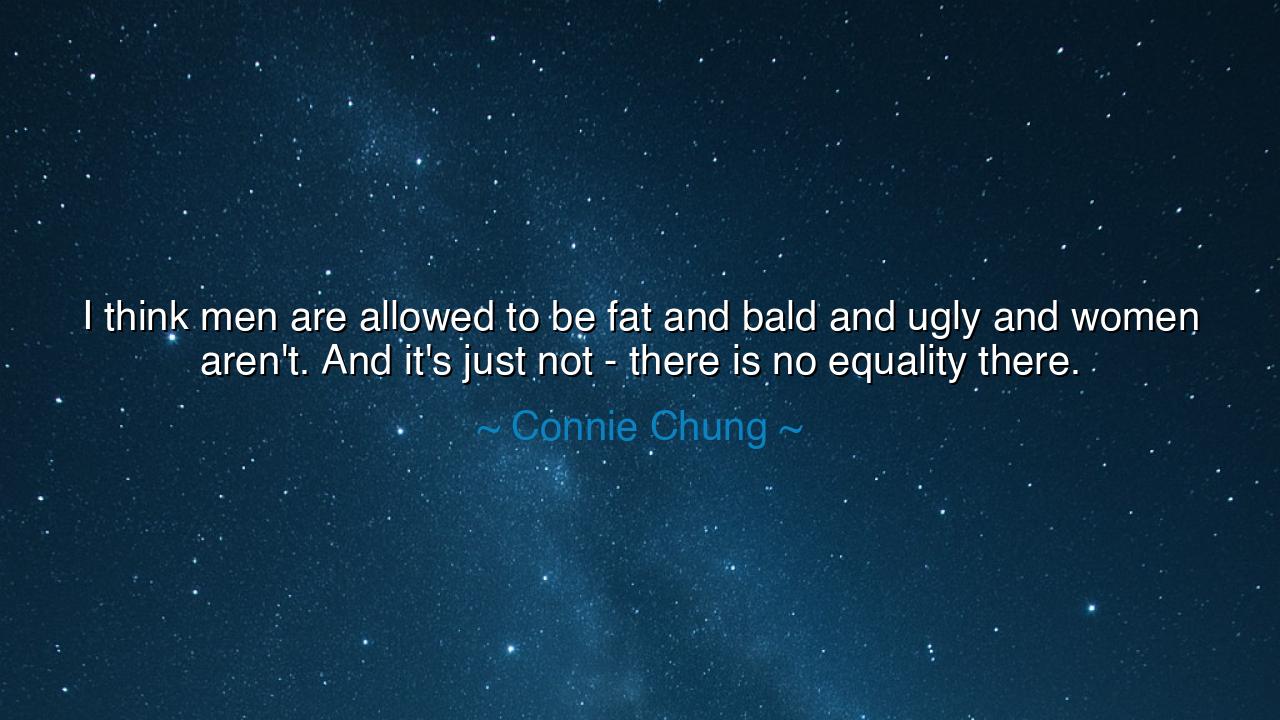
I think men are allowed to be fat and bald and ugly and women
I think men are allowed to be fat and bald and ugly and women aren't. And it's just not - there is no equality there.






“I think men are allowed to be fat and bald and ugly and women aren’t. And it’s just not—there is no equality there.” So spoke Connie Chung, piercing through the veil of polite silence with the clarity of truth. In her words we hear not merely complaint, but lamentation—a cry against the double standard that has stalked women across centuries. For the world often grants men the liberty to age, to falter in appearance, to remain worthy even as beauty fades. But for women, it heaps the burden of expectation, demanding unchanging youth, unblemished skin, and everlasting charm. This imbalance is not trivial, for it reveals the deeper chains of inequality still clinging to the human spirit.
The ancients too grappled with this shadow. In Greece, the philosopher could be admired for his wisdom though stooped with years, his bald head crowned by intellect. But the women of Athens were often judged solely by beauty, their worth measured by the curve of their bodies rather than the sharpness of their minds. Even in Rome, matrons bore the dignity of family honor, yet the poets still sang more often of their fading looks than their enduring strength. Chung’s words, then, are not bound to her own time, but are part of a timeless struggle: the cry of women against being valued more for form than for soul.
Consider the story of Eleanor Roosevelt. She was mocked relentlessly for her appearance, called plain, even ugly, by critics. Yet she became one of the greatest voices for human rights in the twentieth century. Her speeches helped shape the Universal Declaration of Human Rights, her compassion changed lives across the globe. Still, the cruelty of society’s judgment upon her face lingered. A man with her achievements would have been praised as wise and strong despite his looks. But Eleanor was forced to carry both the weight of her work and the sting of superficial judgment. Thus Chung’s words strike home: there is indeed “no equality there.”
And in modern times, the story continues. On screens and stages, men with gray hair and lined faces still win admiration and leading roles, while women of the same age are often pushed aside, replaced by younger counterparts. News anchors, actors, politicians—all reveal the same double vision: men’s worth tied to power and intellect, women’s tethered still to beauty and youth. This imbalance robs society of voices, of wisdom, of contributions that could shine, if only the gaze were just.
But Chung’s statement is not only sorrow—it is also a challenge. To name injustice is the first step in overthrowing it. To declare “there is no equality there” is to summon us to build it. Her words call us to strip away these false standards, to remember that the dignity of a person is not in the texture of their hair nor the smoothness of their skin, but in the fire of their spirit and the depth of their deeds. For when women are freed from the tyranny of superficial expectation, humanity itself is enriched.
The lesson is clear: reject the double standard. Do not weigh men and women by different measures. Celebrate beauty where it exists, but do not make it the price of respect or the condition of worth. Let wisdom, courage, and compassion be the measures of greatness, whether in man or woman, young or old, handsome or plain.
Practical wisdom follows: when you see the world praising men for their work while scrutinizing women for their appearance, speak against it. When you are tempted to judge by looks alone, remind yourself to see deeper. Teach children, both boys and girls, that dignity is not bound to beauty, that their worth lies in their humanity. In doing so, you loosen the chains of inequality that Chung decried, and you move the world one step closer to justice.
Thus, though her words are simple, Connie Chung speaks with the force of the ancients: exposing the hypocrisy of her age, echoing the struggles of women long before her, and summoning us to live differently. Equality will only come when we see each other not as surfaces to admire or reject, but as souls, ageless and enduring, worthy of respect in every form.






AAdministratorAdministrator
Welcome, honored guests. Please leave a comment, we will respond soon